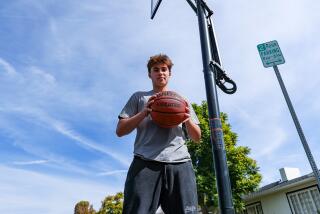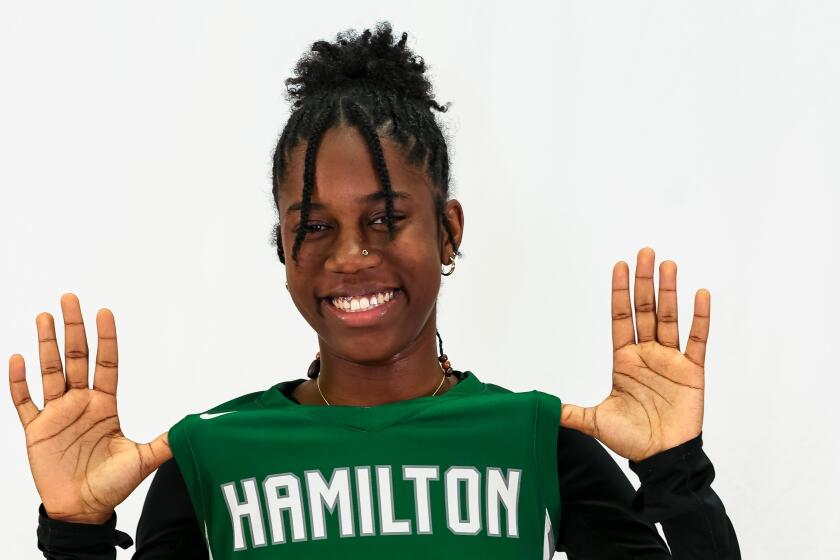Loyola Brought Down to Earth by Waves, 79-64
Loyola Marymount went into Saturday night’s game with a 10-game winning streak, the lead in the West Coast Athletic Conference, a sold-out field house and masses of suddenly faithful fans.
Loyola finished the night with a one-game losing streak, a tie for first and a headache in the form of a 79-64 loss to Pepperdine.
The victory lifted Pepperdine into the first-place tie with Loyola, each with an 8-1 conference mark. Pepperdine’s overall record went to 20-4, marking the fourth season in the last five that the Waves have won at least 20 games.
Loyola fell to 16-7 and was never in the game after the first 15 minutes. In truth, after the weeklong hoopla and big-game buildup, Pepperdine had to wonder what the fuss was all about.
The Waves built an 11-point lead at the half and rapidly increased that to 75-50. Loyola never came closer than nine points, rarely got second shots and generally was out of its rhythm, disappointing the home fans in a record Gersten Pavilion crowd of 4,465--about 300 above the listed capacity.
Pepperdine played consistently well at both ends, controlled the boards, 40-29, had four players in double figures and put the wraps on Loyola scoring stars Keith Smith and Forrest McKenzie, who had 14 points apiece.
Pepperdine Coach Jim Harrick said Loyola probably knew his team well, but that wasn’t enough. “We’ve got too many guns,” he said. “We’re easy to scout but hard to beat.”
Sixth man Grant Gondrezick led the Waves with 19 points on 9-for-12 shooting. Guard Dwayne Polee added 16 points, forward Eric White had 14 and point guard Jon Korfas had 10 points and 13 assists.
“All year, I’ve been waiting for us to play with consistency on offense and defense,” Harrick said. “Tonight we did it. Another thing we’ve been missing all year long is emotion. Tonight we played with it.”
The standings and local rivalry made for an emotional atmosphere, but several Loyola players appeared jittery. Only Smith and McKenzie scored baskets for Loyola in the first half, and McKenzie was held to two points in the second half.
For Pepperdine, it was a big game but not the first big game. “I didn’t say it all week long,” Harrick said of his team’s advantage in big-game experience, “but we’ve played Kansas, we’ve played DePaul, we’ve played some kind of people.”
Loyola broke out to a 10-4 lead on the shooting of McKenzie, who had 8 of the Lions’ first 10 points.
However, Loyola’s younger players looked shaky much of the half, and Pepperdine, spurred by eight quick points by Gondrezick off the bench, put on a 26-10 spurt and held a 34-23 halftime lead. McKenzie kept the Lions in the game with 12 points. Polee had 10.
Loyola shot only 29% in the first half--16% without McKenzie’s six field goals--and further hurt itself by hitting only 7 of 13 free throws. Pepperdine had no free throws in the first half but had 17 field goals to Loyola’s 8.
“We were just kind of out of sync,” Loyola Coach Paul Westhead said. “I’m more prone to give credit to Pepperdine than to blame us. We just never got into a good playing flow.”
Had the game been closer, the story might have been the Great Out of Bounds Controversy. Westhead complained constantly throughout the first half that Pepperdine players were delaying the ball after making a basket. Loyola likes to run after the opposition scores a basket. Pepperdine’s Anthony Frederick was warned once when he kicked the ball.
” I think it’s unfortunate, with a running team, the number of deflections of baskets that were allowed,” Westhead said. “They’re supposed to call that, whether it’s accidental or not. We have to have the ball. The game was within reach in the first half, so anything’s significant.”
Harrick denied any such defensive plot, other than to harass the in-bounds pass. Turning up his twang a notch, he protested: “I wouldn’t do that. We did it one time. They warned us one time. We didn’t touch the ball.”
It probably didn’t matter. The league race now comes down to the last five games. Each team plays Portland and Gonzaga at home this week, then travels to Santa Clara and San Francisco the following weekend.
They finish the season with the rematch at Malibu on March 5.
“This thing isn’t over yet,” Harrick said. But for a week, at least, the Waves are winners and still champions.
More to Read
Get our high school sports newsletter
Prep Rally is devoted to the SoCal high school sports experience, bringing you scores, stories and a behind-the-scenes look at what makes prep sports so popular.
You may occasionally receive promotional content from the Los Angeles Times.






